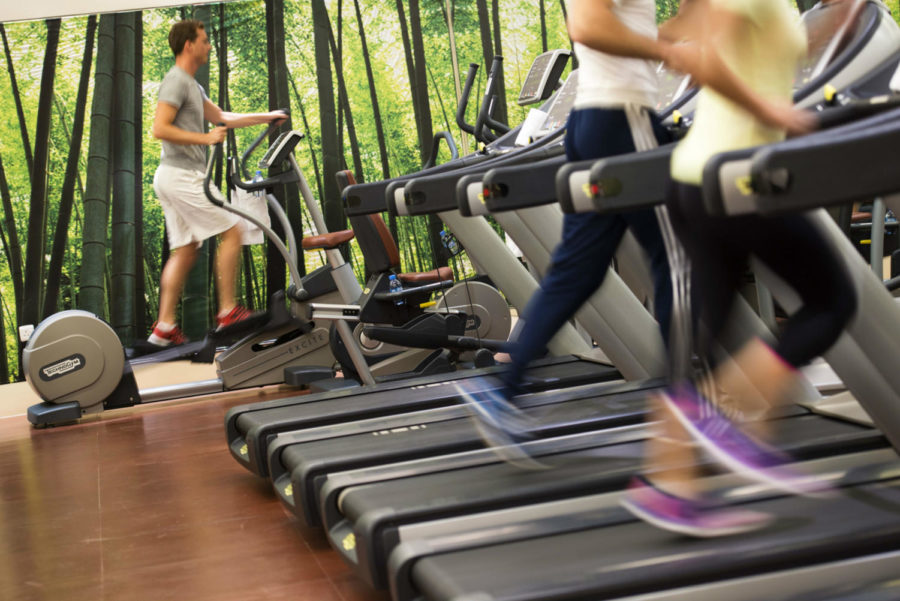Why Every University Student Should Make Fitness a Part of their Lives
“What motivated me to work out more often was that I realized what going to the gym was doing for me—it was an escape.” Photo credits: https://www.qf.org.qa/content/the-foundation/issue-87/destination-education-city
Back in high school, I used to dread exercise. At my boarding school, we were forced to wake up early three times a week to run around our 18-acre campus, and then we were still expected to get through a day of classes. I found it to be close to torture.
Then I came to university. Things were different here: I had the freedom to choose when to exercise and I had a gym available all day for that very purpose. In the beginning, my entire friend circle was very motivated to work out and we’d go together every day. However, the semester took its toll soon and we all drifted apart into our own workloads, unable to make it to the gym together all the time. At that point, I thought I was naive to think I’d ever be able to have a set routine workout schedule.
However, it comes as no surprise that I was at that point just like any average college student. According to research by the University of San Antonio, Texas, 40-50 percent of college students are physically inactive. More importantly, they also note that health professionals in higher education have not been able to effectively increase students’ physical activity behaviors.
There can be many reasons for the fact that this is the case, mostly because students find it difficult to balance university work and keep fit. Mona Saif, a sophomore at Georgetown University in Qatar, said, “when I first moved here, it was not really [easy to work out all the time], [but] it’s just a matter of time management.”
I think what motivated me to work out more often was that I realized what going to the gym was doing for me—it was an escape. An escape from the stress and turmoil of being a freshman beat down by a new place and new expectations. An escape from the loneliness of living in dorms, an escape from the anxiety I was feeling from culture shock and my own fears, and an escape from constantly having my life revolve around people other than myself.
After a long day of classes and shifts at my student job, I’d be too worn down to sit and finish assignments and homework. I would instead fall asleep and wake up in the middle of the night to do my work. This not only ruined my eating and sleeping schedule, it made me very unproductive in class and I felt tired all day.
One day, after a long day of classes, I had some time off, so I decided to go to the gym by myself. I thought it might help me not fall asleep and I needed a break from my books. From then on it became a part of my daily routine because I instantly felt rejuvenated after my workouts, and I could hit the books right after and still fall asleep on time. On the plus side, I even started to lose weight, feel healthier and manage my time better. The next semester, I decided to tweak my class and work schedule so that I could make it to the gym every day after classes because I am not a morning person.
Experts right here in Education City also confirm all the above benefits as well. When I talked to Patti Collins, a licensed counselor and coordinator of Counseling and Wellnessat Northwestern University in Qatar, she explained that exercise is a great stress-coping mechanism and the psychological improvements I experienced were no surprise.
“When you’re exercising, it’s not possible to ‘what if’ yourself to death about [school work]. The rumination that happens in our minds [about external issues] actually exacerbates that stress, worry and anxiety that’s already there. [Exercise] freshens you not only from a physical perspective, but from a mental health perspective. It provides rest for the emotional part of your brain so emotions don’t get stuck,” said Collins.
Other students quote similar experiences as well. Giordana Bido, a freshman at NU-Q noted, “[Exercise] helps me escape from the stressful daily routine we have here [at university.” Bido loves the Zumba classes offered twice a week at the HBKU Student Center as she loves dancing. “[Zumba] helps me to relax and I don’t think about anything else but the movements I have to follow,” she added.
Studies have consistently proven the benefits of exercise too. A research article published in the International Journal of Exercise Science found that an inverse association exists between physical activity and poor mental health. It also explored the impact of a program called Fitness4Finals (F4F) at universities, that aimed to boost physical activity and mental relaxation during finals week. While the physiological measures of stress in the study were not significantly different, the perceived stress reduction reported by F4F participants was influential.
Amie Rollins, director of Health and Wellness at CMU-Q, who is also a licensed nurse, explained that she has seen similar patterns in students before. “Students who engage in regular physical activity have noted improved sleeping habits, increased focus and concentration in classes and better stress management…students often have the misconception that they need caffeine to help them when they are feeling tired, but physical activity is the best and most natural way to increase your energy,” said Rollins.
Exercise offers other benefits. For instance, I usually want to be by myself after university hours to recollect, reflect and calm down. But when I stopped going to the gym, I was always bored. I thought I needed more friends but hanging out with people really did not make a difference. It in fact wore me down, did not help me de-stress and made me lazier than I already was. I love my solitude, and fitness has given it a new meaning.
For some people, it might be the other way around. Being around people is motivating. Nadege Mutima, also a freshman at NU-Q, recently joined the female basketball team and said being around similarly motivated girls is encouraging. “I enjoy basketball so much…[it] makes me feel challenged physically and it has helped me connect with different people in the basketball team. It is an opportunity for social interaction, and [it helps me] manage my mental and physical health at the same time.”
So, the psychological improvements were a given, but little did I know it was only the beginning of a long journey to getting fit and feeling healthier in other aspects of my life. Although in the beginning one of my motivations was to lose weight, soon it became clear that is not the main benefit of exercise for a student. After gym became part of my schedule just like sleep, it had a profound psychological impact on me, other than the ones Collins described: I felt like I had my life together, I had my time sorted out with a fixed daily routine, I felt like a was beating stress and feeling fresh, and now my fitness journey has extended to eating healthier by cooking all my own meals.
Collins noted that these patterns of improvement are common too. “[In psychology], we call it a keystone behavior…[exercise] has a ripple effect in so many different parts of your life. It’s important to be making choices that are in line with things that are important to you,” she remarked.
For others, it’s also a way of balancing out their rather unhealthy diets. Both Bido and Mutima said their diets mostly consist of fast food due to the limited options available at EC, but acknowledge the variety of fitness options available to balance that out. Time is a constraint for them, but they make an active effort to take part in fitness activities that they like.
Rollins also reminded me of various other health benefits of exercise: “Engaging in regular physical activity is very important as this lifestyle behavior can help to prevent obesity, heart disease, cancers and diabetes.
This academic year, I have started to push myself even more by working on my strength by doing weights and going to work out classes offered at the Student Center. These community classes are challenging yet fun, and I get to make friends too.
I had always thought all the people who talked about fitness changing their lives were superhuman. I realized that the only superhuman thing is to make fitness personal through determination. You need to be able to figure out what benefits you can draw from it, and which of them you are in urgent need of. And in an environment like college, you have the freedom to tailor your fitness to see what works for you.
Correction: November 8, 2018
An earlier version of this article misspelled Nadege Mutima’s last name. It has since been updated with the correct spellings.















